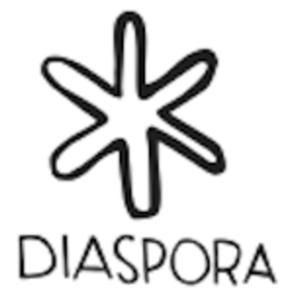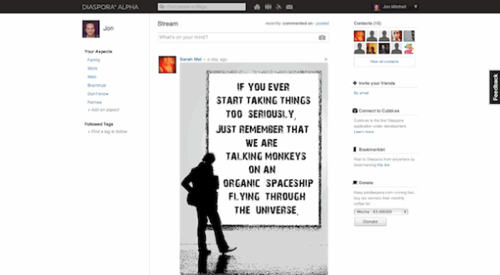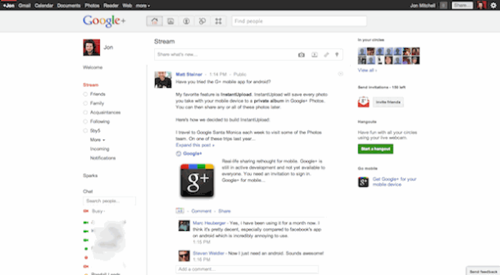Last week, Diaspora, the open-source, privacy-aware social network of our nerdy dreams, posted its first public response to the launch of Google Plus and the recent efforts around privacy and selective sharing at Facebook. For a reaction to news that two Web behemoths are drinking Diaspora’s milkshake in terms of features, the blog post sounds pretty upbeat, with perhaps just a hint of caginess. “We’re proud that Google+ imitated one of our core features, aspects, with their circles,” the Diaspora team writes. “We’re making a difference already.”

Let’s not get into whether Diaspora can take credit for features of Google Plus and Facebook. There are things about Diaspora that still are unique among its competitors. Not only is it open-source, it’s decentralized and distributed. Users are encouraged to set up their own servers. But these are not features for normal human users. In that category, the social networking superpowers seem to have Diaspora cornered.
Diaspora’s current alpha interface. Look familiar?

Circles and Aspects
Diaspora has been called the anti-Facebook for its strong privacy stance, and it had “aspects” before anyone knew about Google Plus and its circles. But Plus exists now, and Facebook is coming around to this whole “privacy” thing. And really, for Facebook, it was just an interface problem, anyway. Why does everybody forget that Facebook has had publishing to select friend lists for a really long time?
If Google Plus has taught us anything, it’s that normal people don’t feel like leaving the social networks where they already feel settled. Diaspora lets users post their updates to Facebook, Twitter and Tumblr, but it still wants to be a destination of its own. Now that all Diaspora’s user-facing features are available in the dominant social networks, that looks like a tall order.
Google Plus’s current beta interface. Hmm… Deja vu?

Social Networks are Sticky
Sometimes, Diaspora seems like it is only a dream; it’s still in closed alpha, so nobody’s home. It’s real, though; I promise. I’ve had alpha access for about a year, although I’ve only convinced 10 of my friends to accept my invites. And some of them haven’t added so much as a profile pic yet. And none of us, myself included, has posted more than once.
Social network inertia is real. Has Google Plus killed Facebook yet? No. Diaspora can take credit for Google Plus circles all it wants, but Google reached beta first. I’d be happy to show you more Diaspora screenshots, but it’s really mostly white space and things that look like Google Plus.
Diaspora’s team explains the motivations for the service:
Diaspora’s Defense
Yosem Companys, Diaspora’s chief evangelist, insists that we do need a new home on the social Web. “Facebook really was fun for a while there,” he says. “People who showed up revealed and shared their authentic selves. … Today, what we see is people using Facebook only to say the most innocuous personal things, to market their own services, or to forward content created by others. As a result, Facebook has become boring and even depressing. We still go there because it’s part of our routine, and for fear of missing something, but it’s like an old favorite TV show on its 8th season, when the original magic is gone.”
That’s anecdotal, though. I’ve been a Facebook user since 2005, and it got depressing for a while, but I think certain recent features, particularly the Groups overhaul, have made it as fun and fulfilling as ever in its current incarnation, if you can get over the ads. But that’s all just opinion. The data, however, show that Facebook is absolutely crushing it as far as traffic, and it is offering new mobile extensions of its network into the real social world where people have fun. Diaspora use is a desk activity.
Regarding Google Plus, Companys hits the new kid on the block where it really hurts: the real names policy: “All kinds of people have good reasons to be inhibited by this policy, including people looking for work, women, people expressing views different from their parents’, famous people, and pretty much anyone outside the mainstream of the community where they live.” Diaspora has no such policy, and it offers progressive new ways for members to self-identify, such as an empty text field for gender.
But is this enough to convert the hundreds of millions of people who have already settled into social networking habits? Only if Companys’ anecdotal evidence is true, and that remains to be seen.
Whither Diaspora?
Is there anything Diaspora can do? I think so, but it’s a departure from it’s current incarnation, which is an awful lot like Google Plus (or vice versa, or whatever). It’s unrealistic to expect a mass exodus from one social network that works to another of which no one has ever heard. Diaspora’s potential is in its ability to syndicate to our other services (currently Facebook, Twitter and Tumblr) while still allowing us to own our data. Companys notes that “our service already includes outbound syndication … and it will include inbound syndication, too.” So this use case sounds like it’s in the cards.
If Diaspora is built as a publishing platform that lets us own our content and direct it to our existing networks – and especially if we can read from them, too – it would be an awesome, welcome tool that even Dave Winer could love. But if the launch of Google Plus wasn’t splashy enough to start a mass Facebook exodus, a later launch of a service that looks the same is not going to do it.
What isn’t working for you about the social Web? What would you like to see change?





















